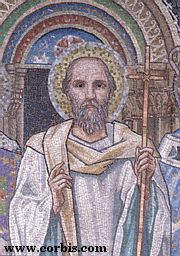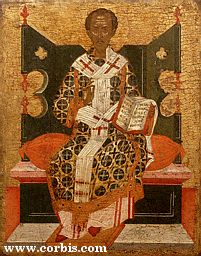Readings:
Jeremiah 1:4-10
Psalm 49:1-8
1 Corinthians 12:31-13:7
Luke 21:12-15
Preface of a Saint (2)
[Common of a Theologian and Teacher]
[Common of a Pastor]
[For the Ministry II]
[Of the Holy Trinity]
[For Prophetic Witness in Society]
PRAYER (traditional wording)
O God, who didst give thy servant John Chrysostom grace eloquently to proclaim thy righteousness in the great congregation, and fearlessly to bear reproach for the honor of thy Name: Mercifully grant to all who proclaim thy word such excellence in preaching that all thy people may be made partakers of the glory that shall be revealed; through Jesus Christ our Lord, who liveth and reigneth with thee and the Holy Ghost, one God for ever and ever. Amen.
PRAYER (contemporary wording)
O God, who gave your servant John Chrysostom grace eloquently to proclaim your righteousness in the great congregation, and fearlessly to bear reproach for the honor of your Name: Mercifully grant to all who proclaim your word such excellence in preaching, that all your people may be made partakers of the glory that shall be revealed; through Jesus Christ our Lord, who lives and reigns with you and the Holy Spirit, one God for ever and ever. Amen.
Lessons revised at General Convention 2024.
Return to Lectionary Home Page
Webmaster: Charles Wohlers
Last updated: 30 Nov. 2024
JOHN CHRYSOSTOM
BISHOP OF ANTIOCH AND OF CONSTANTINOPLE, PREACHER, THEOLOGIAN, LITURGIST
 John
was called "Chrysostom" ("Golden Mouth") because of
his eloquence. He was a priest of Antioch, and an outstanding preacher.
(Audiences were warned not to carry large sums of money when they went
to hear him speak, since pickpockets found it very easy to rob his hearers
-- they were too intent on his words to notice what was happening.) His
sermons are mostly straightforward expositions of Holy Scripture (he has
extensive commentaries on both Testaments, with special attention to the
Epistles of Paul), and he emphasizes the literal meaning, whereas the
style popular at Alexandria tended to read allegorical meanings into the
text. He loved the city and people of Antioch, and they loved him. However,
he became so famous that the Empress at Constantinople decided that she
must have him for her court preacher, and she had him kidnapped and brought
to Constantinople and there made bishop. This was a failure all around.
His sermons against corruption in high places earned him powerful enemies
(including the Empress), and he was sent into exile, where he died. Along
with Athanasius of Alexandria, Basil the Great, and Gregory of Nazianzus,
he is counted as one of the Four Great Eastern (or Greek) Doctors of the
Ancient Church. The Four Great Western (or Latin) Doctors are Ambrose,
Jerome, Augustine, and Gregory the Great.
John
was called "Chrysostom" ("Golden Mouth") because of
his eloquence. He was a priest of Antioch, and an outstanding preacher.
(Audiences were warned not to carry large sums of money when they went
to hear him speak, since pickpockets found it very easy to rob his hearers
-- they were too intent on his words to notice what was happening.) His
sermons are mostly straightforward expositions of Holy Scripture (he has
extensive commentaries on both Testaments, with special attention to the
Epistles of Paul), and he emphasizes the literal meaning, whereas the
style popular at Alexandria tended to read allegorical meanings into the
text. He loved the city and people of Antioch, and they loved him. However,
he became so famous that the Empress at Constantinople decided that she
must have him for her court preacher, and she had him kidnapped and brought
to Constantinople and there made bishop. This was a failure all around.
His sermons against corruption in high places earned him powerful enemies
(including the Empress), and he was sent into exile, where he died. Along
with Athanasius of Alexandria, Basil the Great, and Gregory of Nazianzus,
he is counted as one of the Four Great Eastern (or Greek) Doctors of the
Ancient Church. The Four Great Western (or Latin) Doctors are Ambrose,
Jerome, Augustine, and Gregory the Great.
by James Kiefer
 There
are lots of his sermons online (six volumes worth) at the Early Church Fathers site.
There
are lots of his sermons online (six volumes worth) at the Early Church Fathers site.